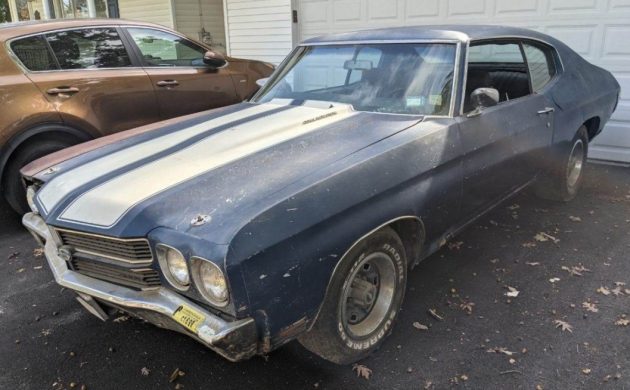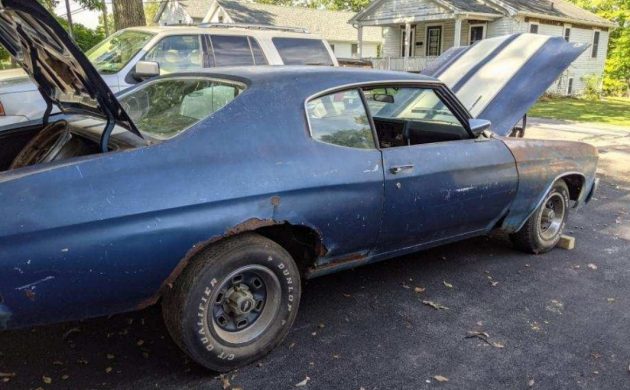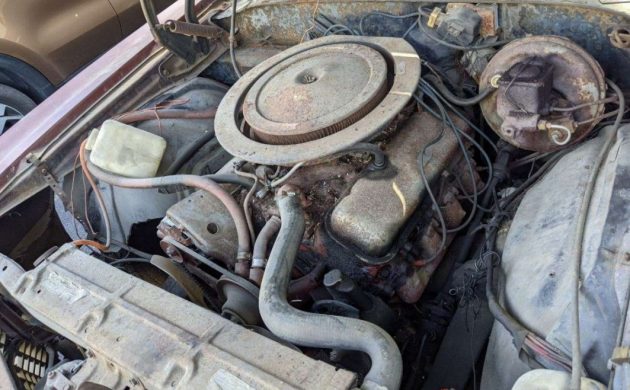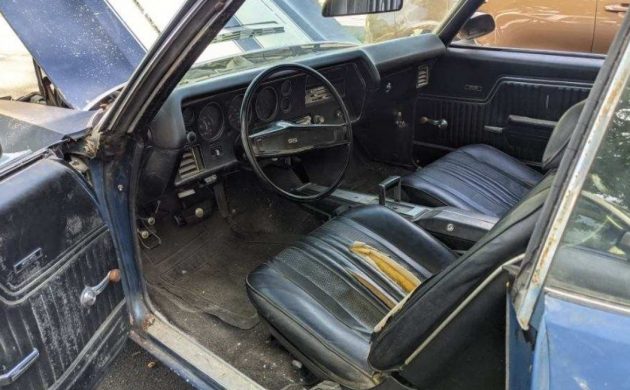The muscle car movement was at its peak in popularity in 1970. After that, the detuning process would begin so that these cars could run on unleaded fuel and produce fewer emissions. The Chevelle SS 396 was still the favorite among youthful buyers wanting a potent Chevrolet. This ’70 SS 396 has the L34 engine, the most commonly ordered version in the mid-size muscle machine. It’s been off the road for 30 years and garaged for the last 26. Located in Clarks Summit, Pennsylvania, it’s available here on Barn Finds Classifieds for $23,500.
Out of some 289,622 Malibu Sport Coupes built in 1970 with a V8 engine, 51,455 of them came with the RPO L34 engine that produced 350 hp. Though still marketed as a “396”, the engine’s actual displacement was slightly over that at 402 cubic inches (after all, who would get excited about an SS 402?). It featured a two-bolt main engine block with 4.125-inch bores, a 3.76-inch stroke crankshaft, 10.25:1 compression ratio, a Rochester Quadrajet carburetor, and a low-rise, cast-iron intake manifold. This excluded the new powerhouse motor of the year, the 454 V8.
Assembled in Arlington, Texas, this 1970 SS 396 was on the road last in 1991 when it made a trip from New York to Pennsylvania and was running when it was parked. 30 years later, it has finally come out of mothballs and needs someone to restore the Fathom Blue car to its original glory. It’s a well-used vehicle, with a claimed mileage of 157,176. The motor is flanked by a TH-400 automatic transmission and there is no mention is any attempts have been made to get it running. The drivetrain is said to be numbers matching, a huge plus.
The motor was rebuilt some 25,000 miles ago, so if it turns freely perhaps going back into it won’t be necessary. Paperwork will accompany the car, including the original dealer invoice that states it was purchased for under $5,000 all-in when new. We’re told the frame and floorboards are solid, but it’s going to need a lot of help with the fenders and rear quarter panels. The latter on the driver’s side looks to contain a lot of filler and it’s trying to pop back out. Other than recovering the driver’s seat and maybe replacing the carpeting, the interior might just clean up. These were impressive cars when new and more so today when restored.









Once had AC?
no evaporator core housing is not in engine bay
First car I ever sat in the drivers seat and drove myself was a 70 4 speed ss396. Ruined me for life.
HAHA, i wouldnt say ruined
$23,500?! Hahahaha, more like $2,350!
For $2,350 I’d buy all you could find. By the way, I have a 65 GTO and a 65 Crown Corvair and a 66 convert!
Bully for you!
$23K for a PA rot-box that needs $100K in resto costs to get a car worth $60K on the other side. Some cars should just die.
Rat dung all over the rat! But all the parts (mechanical & body panels, etc.) are available… so, someone will take it on. May be a show winner one day.
Everybody wants close to the restored price for one that needs restoring!
As a shop owner, I know well what time and money goes into restoring a classic. You can almost never get your money back.
These things are like belly buttons. It seems we see this model at least three times a week.
Mighty rough, GLWS.
Matching numbers means nothing. Most over used terminology in this so called hobby. You can buy tools to make your own matching numbers engine in Hemmings Motor News. I know. I was the editor there in 2005 to 2007. This pile of boring rust is less than am hour from me. With gas what it is, forget a trip. You are looking at plenty of time and $$$$$$ here. As one comment read, an L34 base 70 Chevelle is very common.
Geez, George, who peed in you wheaties?
I’m still trying to figure out why when I bought my 70 SS I was told the 396 didn’t exist anymore. That I had to get a 400.
Because someone didn’t know what they were talking about. But I will say that GM did call the 396 a “400 4bbl” for the 1971 Chevelle model year.
In 1970, the 396 received a .030″ overbore, resulting in a 402 cubic inch displacement. Chevrolet decided to keep the known and respected name, SS 396 rather than change the name to SS 402 which likely would have resulted in a loss of sales. To add to the confusion, Chevrolet also offered a Malibu 400 package, which was again, the 402 engine. Chevy dropped the “396” designation beginning in 1971
Edward, the 1970 Chevelle SS (and El Camino) standard big block engine actually displaced 402 cubic inches, the result of an .030 overbore. Chevy decided to retain the well known SS 396 name due to it’s popularity, in other words, sales. They figured changing the name to SS 402 would likely result in a drop in sales, and they were probably correct. Interestingly, there was a Malibu 400 package (non-SS) that had the 402 engine that they referred to as a 400 engine. To add to the confusion, Chevy also introduced the 400 small block engine that year, which was actually 400 cubic inches. The 396 name was dropped from the SS package beginning in 1971. The SS came with a 350 small block, with the 402 big block as an option.
So then when I said I wanted an SS396 did the dealer say there was no more 396, that it was now an SS400? Was he just forked up?
The SS 396 was the Regular Production Order (RPO) Z25 package, there was no SS 400. Maybe the sales guy was dazed and confused (smoking a little weed?) and got confused when Chevy said the 396 engine was replaced with the 402. Adding to the confusion, you could order RPO LS3, which was another 402 big block with a milder cam. It was available on any Malibu or El Camino unless the car was ordered with RPO Z25 or RPO Z15 (454) packages. Chevrolet referred to the RPO LS3 as the 400-4, the 4 designating the 4 barrel carburetor. To further confuse things, Chevy offered option RPO LF6, which was the 400 CID small block with a 2 barrel carb. It was available in the full-size Chevrolets and the Monte Carlo, but it was NOT available in a Chevelle. Crazy stuff…